If you would like to volunteer with refugee children in Europe, Poland is a good place to do so. Recent conflict in the region has already forced an influx of millions of refugees from Ukraine into Poland which has put a massive strain on social infrastructure. Volunteers are needed to deal with the vast and varied needs of the refugees who are largely women and children.
I have wanted to work with refugees for a long time. After hearing that entire orphanages were moving from Ukraine to Poland, I decided that I really wanted to work with children. Having once been a child refugee myself, their plight was very familiar to me.
Lo and behold, an organization I have been following for some time, called Fundacja Ocalenie (meaning the Rescue Foundation), announced that they needed volunteers to work in pop-up daycares at various refugee-reception points in Poland at or near the Ukrainian border.
The need was immediate. I didn’t hesitate since I already live in Europe and the flight would be short and affordable. Ever since the start of this crisis I felt a physical need to do something tangible to help.
Right away I submitted the required form with my information and reasons why I thought I would be a good fit to work with refugee children. I was accepted the next day and I quickly booked my flight from Paris to Warsaw for the upcoming weekend. I needed to be in Warsaw that particular weekend for the mandatory workshops before being deployed to the border.
I then rearranged my work schedule for the following 12 days in such a way that I could entirely focus on volunteering. I am so glad that I am a digital nomad. This type of lifestyle gives me immense flexibility to follow my passions and to use my time as I see fit.
What follows is the story of my experience volunteering in Poland for nine days. I spent the first two days preparing and learning at Fundacja Ocalenie in Warsaw. From there we were deployed to the border for a week. I had an option to stay for two weeks but since it was my first time traveling to volunteer I decided to only do one week. Let’s be honest, I had no idea what to expect and I was nervous. Not only was I venturing into a new experience, I was doing it completely alone.
Table of contents
- General information about volunteering with refugee children in Poland:
- What to expect at the weekend training at Fundacja Ocalenie:
- My week volunteering near the Ukrainian border:
- Day 1: Monday: I head to the border.
- Day 2: Tuesday: Time to pull up our sleeves.
- Day 3: Wednesday: We finally meet the kids!
- Day 4: Thursday: Getting into the swing of things.
- Day 5: Friday: We get some young troublemakers in our daycare.
- Day 6: Saturday: Last full day at the daycare.
- Day 7: Sunday: We head back to Warsaw.
- FAQ
- Final Thoughts
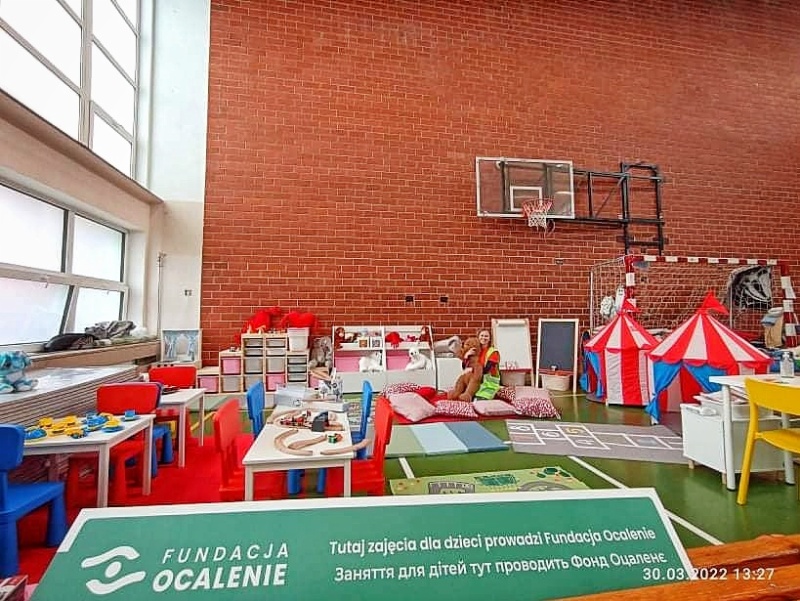
General information about volunteering with refugee children in Poland:
What to expect in general
Here are the things you need to know ahead of time (based on my experience in March and April 2022):
- In order to volunteer with Fundacja Ocalenie in the capacity of a daycare worker, I had to attend a full weekend of workshops in Warsaw. The organization provided food during this training but accommodations in Warsaw were my own responsibility, as were meals outside of these learning sessions.
- I was asked to donate a minimum of one week, maximum two at a time.
- The organization paid for my public transport to the border from Warsaw and back. They bought a train ticket for me. They rented cars on behalf of other volunteers for easier access to other refugee centres on Polish territory. Any money I spent getting to and from Poland was my own expense.
- We worked in teams of three volunteers at each daycare point and we had a regional coordinator to help us do our jobs.
- Our daycare points were in small Polish villages or towns near the Ukrainian border.
- The daycare centres (or rather daycare corners) were located within refugee reception points. This meant that a daycare could be in a corner of a high-school gymnasium filled with field beds where refugees sleep.
- We committed to working seven or fourteen days straight in eight-hour shifts from 10 AM to 6 PM with two one-hour breaks in between. We were expected to take those breaks to prevent burnout.
- Remember you’re at a refugee centre surrounded by people in extreme need and distress. It’s natural to want to do it all and help everyone. But you need to focus on the task at hand. There are other volunteer organizations present to deal with other needs and issues.
- You might have to drive if you have a driver’s licence but it’s not mandatory although it does make it easier to get to the refugee centres from wherever you are sleeping in border locations.
- The organization put us up in accommodations near the volunteering sites. They were usually rented apartments. The conditions were not ideal in all towns. Be prepared to have a roommate (always your fellow daycare volunteer). Be prepared to share bathrooms and the kitchen, sometimes with others staying in the same rental as you. You might not be able to do laundry where you live. Some locations did not have bedding – we were asked to bring a bedsheet and a sleeping bag for that reason.
- We got a food allowance put into our bank accounts for all the days we volunteered. When I went, the daily allowance was 60 PLN which was plenty for groceries and one daily meal out. You can however eat for free at most of these refugee centres – as a volunteer you have the right to do so. And sometimes, due to the location of the point you are working at, you might have no other choice.
- Be prepared for some tough emotions. Depending on your own personal experiences, some of the situations you encounter might be triggering. I had some tough moments at the beginning but with time I was able to rein in my emotions. Which is important when working with refugees.
What to bring (packing advice)
- Pack lightly.
- Bring enough underclothes in case you have no chance to do laundry.
- Your clothes should be comfortable. Sporty clothes are great for work with children, especially things like yoga pants.
- If you are going in the fall, winter or spring, bring an appropriate jacket, a scarf, and even a hat and gloves.
- Bring one bed sheet and a sleeping bag.
- Bring some cash but most places in Poland accept cards.
- Pack some vegan foods if you’re a vegan.
- Your accommodation might not have WiFi so make sure you have enough data on your mobile plan. If not, get a Polish SIM card ahead of arriving at the border. Refugee centres usually have WiFi.
- Bring a power bank for your cell phone just in case.
Safety & health tips
- Keep your important documents in a pouch under your clothing.
- Always have your phone charged and on you.
- Ensure tap water is safe to drink in the town and refugee centre you are working in (tap water is usually safe to drink in Poland even though most Polish people prefer bottled water for taste reasons).
- Make sure you have medical and travel insurance.
- If you have any illnesses or allergies bring any necessary medication with you.
- Don’t go anywhere in a car with a stranger. The feeling of wanting to help is overwhelming and situations will come up where you will need to think before you act. Safety first.
- If you are a member of the LGBT+ community and volunteering far away from large urban centres, don’t advertise your sexual orientation. Rural eastern Poland is more religious and conservative than other parts of the country. Your safety while volunteering should be your number-one concern.
- Stick together with your fellow daycare volunteers. Let them know where you are. You are accountable to each other.
- Make sure you are fully vaccinated. You will be working with kids and while our team was lucky, others had gotten sick, if not with COVID, then with other illnesses that often roam in daycares.
- If you do get sick, there are medical points at each refugee centre.
- If you are feeling emotionally overwhelmed, you can talk to any of your team members or any coordinators at Fundacja Ocalenie. Communication at this foundation is amazing. I always felt well connected to their network of people.
- If for some reason you cannot stay your full week or two weeks, arrangements can be made to bring you back.
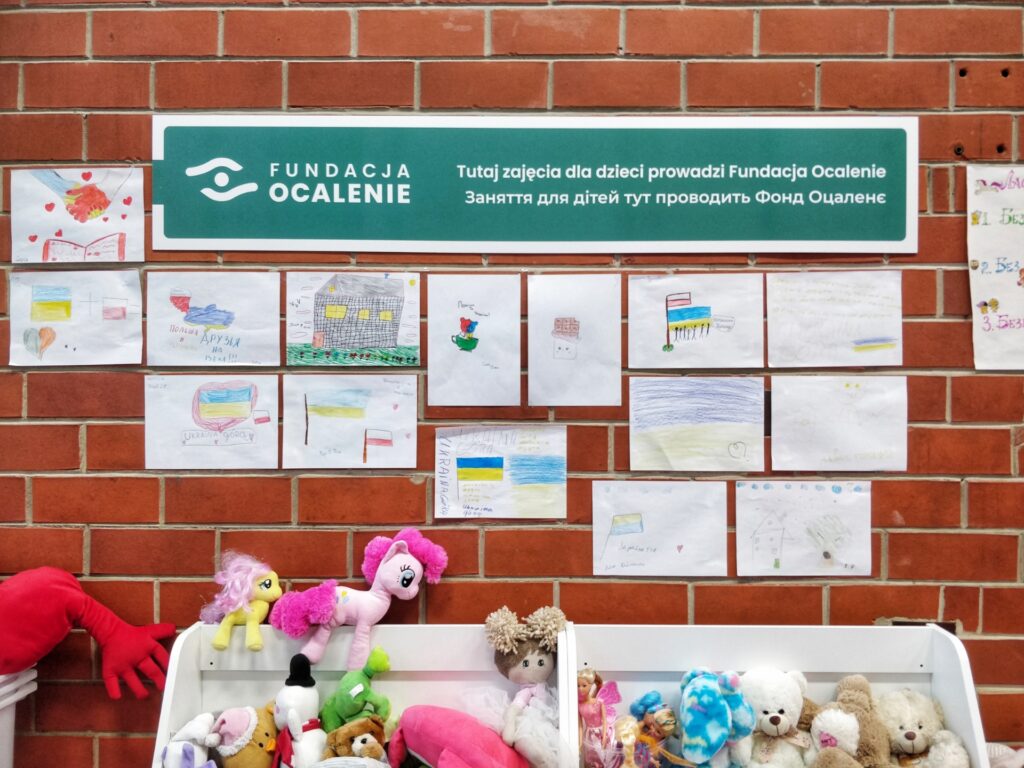
Other tips
- Be prepared for some situations that trigger tough emotions. Take a time out if needed. Talk to fellow volunteers or your regional coordinator.
- Don’t stare. Your daycare centre will very likely be surrounded by people sleeping on field beds, being vulnerable on full display. Give them space and dignity. Think of it as their temporary home and you are a guest there.
- Focus on your volunteering assignment. It’s not your job to find housing for the refugees, transport them to another country or give them job advice. There are other organizations and volunteers onsite for those purposes. You are there to work at the daycare. Focus on doing an amazing job with the kids.
- Most Ukrainian refugees speak Ukrainian and Russian. Don’t worry if you don’t speak either language. As many volunteers discovered, a common language can easily be found with children through play. And there’s always Google Translate when all else fails.
- Any questions, doubts or issues: your Fundacja Ocalenie coordinators are always there for you. When I volunteered they were very easily accessible and always on the ball for any small or big need and reason.
Once you return home
- You may need time to digest all you saw and experienced. It is never easy being surrounded by people who have gone through so much.
- You may feel like you did not do enough. Remember you are but one human being. You volunteering your time made a lot of kids happy and gave exhausted parents a much-needed break.
- You will feel glad you took action. Before I went I felt helpless and scared by the unfolding events. But having done a small kindness to people in need really helped me overcome my feeling of helplessness.
- You will inspire others to get more involved. A lot of my friends were very curious about what I did and asked me a lot of questions. One even ended up going to Poland to volunteer.
- You will be asked to participate in “Superwizja”. It is a video meeting with your fellow volunteers and a psychologist to go over your experiences at the border and how you are dealing with any feelings and difficult emotions after the fact. It is not mandatory to participate but I really did enjoy hearing others’ accounts and sharing thoughts and experiences and learning from each other.
- You may be asked to give your taxpayer number from whatever country you file taxes in. NGOs need to give detailed reporting to their donors and governmental bodies to show how they spent the funds they received to ensure continued funding.
- You might want to return to volunteer again. You have an option to do so and this time you do not need to attend workshops in Warsaw since you are now fully trained and experienced.
You might also like reading about how to best prepare for a volunteering trip abroad.
What to expect at the weekend training at Fundacja Ocalenie:
First Day: Saturday Workshop with a Child Psychologist (9 AM – 5 PM)
I spent the entire Saturday in a training seminar by a child psychologist with 16 years of experience with child refugees. I unexpectedly shed some tears in the morning at the start of the workshop because of my personal experience as a child refugee. The crisis has been very triggering for me at the start.
The overall purpose of this first day is to learn about children in trauma, to get to know the staff and other volunteers and to be given tools on how to best structure a day in a daycare.
We started the day off with introductions and discussing our fears, expectations and what we can bring to the table. It was good to hear that I was not alone in my fears. I had never worked with refugees and even having been one did not feel like it was enough.
Other staff and coordinators of Fundacja Ocalenie also gave us additional training and valuable presentations. Throughout the day, we were provided with snacks and refreshments and a delicious vegan lunch from Kuchnia Konfliktu which is a catering outfit in Warsaw run by refugee women fleeing conflict.
After lunch, we discussed different situations that could arise with children who experienced war trauma and how to deal with them. We planned games and a structure for an ideal day with kids. I was glad to have a plan in mind but I later learned that some days all my plans had to be thrown out the window once I was at the daycare centre. You will have to go with the flow.
We also spent time discussing how to recognize abused children and what to do if we suspected abuse during our upcoming week volunteering.
We were also presented with rules about what we can and cannot do as volunteers. Then we went through a list of potential situations that could arise and reviewed actions taken by fictional volunteers to resolve those situations. We also learned about how to deal with children in distress and potential unusual behaviours and how to appropriately respond in such situations.
Second Day: Sunday Workshop with Coordinators (9 AM – 1 PM)
Sunday was the day dedicated to logistics and admin. We met the main coordinator for the refugee children’s program who went over legal and technical aspects of things. Some background checking took place, some documents were signed.
We were put into teams of three volunteers based on who could drive, who spoke either Ukrainian or Russian, etc. Teams were assigned to different locations. Some of us went in cars rented by the organization and others got train tickets to their destinations. We were deployed to six different villages and towns in south-eastern Poland near the Ukrainian border.
We were told we would live in either apartments (one per group of volunteers) or in hostels booked by the foundation. Some teams left right away after the second workshop, others left the next day and the rest were going the week after to replace the first round of volunteers. Most of the daycare points needed to be set up still since we were the first set of volunteers after the original pilot project was launched just a couple of weeks prior. So we were pioneers of sorts.
Before we left for the border we had to provide a negative COVID test. I was nervous that maybe after all this traveling and mingling with family and volunteers I caught something, but I got an all clear. That was a relief!
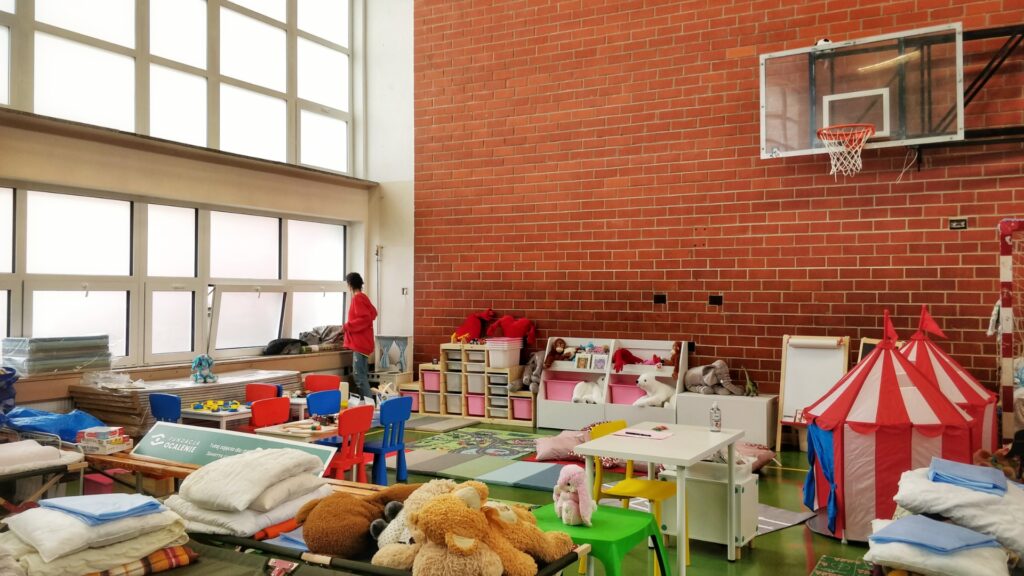
My week volunteering near the Ukrainian border:
Day 1: Monday: I head to the border.
The day before I found out who my team members were going to be but one of them I hadn’t yet met. She had been part of the original pilot project and therefore did not need to participate in the weekend workshops as she was already experienced. She and I were to take the train together from Warsaw to Zamość where we were to help set up and run our daycare.
The second volunteer whom I met at the workshop was herself a recent refugee from Kiev. I admire her for the fact that with fresh trauma she was determined to give back to others. I later learned from her that that was what helped her deal with her own healing.
The train ride from Warsaw to Zamość was five hours long. It would have been only three hours by car. I am not used to such slow trains and I am pretty sure we stopped twice for 30 minutes. I was impatient to finally get to my destination and finally get on with the purpose of my trip.
Our train tickets had assigned seat numbers but there was a glitch – my seat number did not exist! I was reassured by fellow passengers that this was in fact normal. They were right, the conductor who checked my ticket gave me no trouble.
On the train I saw a lot of Ukrainians – mostly mothers traveling with children. A Ukrainian passport or ID allows refugees to travel on public transport in Poland free of charge. Thank goodness for small blessings!
When we finally arrived in Zamość it was already dark outside. We communicated with the main coordinator from Warsaw who was in town to oversee the setup of the daycare points in all the towns and villages. She picked us up from the train station and minutes later we were at our holiday rental. It was very comfortable and we didn’t need to use the sleeping bags we brought. The place was fully equipped, newly renovated and comfortable. We had two bedrooms between the three of us. A third bedroom in the apartment was rented nightly to other visitors who sometimes were Ukrainians returning home.
I breathed a sigh of relief at the sight of our apartment. I was prepared for difficult conditions but there was no need to worry. I did find out later that volunteers at some of the other border locations had to put up with much more basic conditions. But this was no vacation. We signed up to be useful. A little discomfort would be nothing compared to what refugees had to go through to finally make it to safety.
After we settled in, we went out for supper with the coordinator. Zamość is a beautiful little city filled with a lot of history.
Day 2: Tuesday: Time to pull up our sleeves.
Our second day at the border ended up being a day full of experiences and emotions. Since none of the daycare centres existed yet (except one that was a pilot project), we needed to set them up. We helped set up two of them. One is in Dorohusk, a border village. But first we picked up a woman who would be a full-time employee at that daycare, the smallest one of all the border daycares set up by Fundacja Ocalenie.
The reception point in Dorohusk was minutes away from the border crossing, so close in fact that my two SIM cards welcomed me to Ukraine. The centre was located in one of a handful historical attractions in the village: the Suchodolski Baroque Palace. For a palace it was rather small and it was being used only as a processing centre for those who first crossed the border from Ukraine into Poland. Afterwards people moved on to sleep elsewhere.
The daycare we were helping set up would be in the corner of the small dining room where refugees were brought to have their first meal outside of a war zone. The space was tiny but the kids who would play here would only need to spend a few hours here, no more. While waiting for IKEA who donated all the furniture and toys, we rearranged the dining-room tables after consulting with the volunteers running the Dorohusk refugee reception point.
We toured the premises and discovered a mishmash of volunteers and organizations present. There was Caritas, us from Fundacja Ocalenie, local independent volunteers, a veterinary point, a medical point and a trailer with free SIM cards for Ukrainian refugees.
Most volunteers were Polish but I detected some English speakers. I was curious and I approached them. I learned that they were young siblings from the UK who, moved by the plight of the Ukrainian refugees, dropped everything to come to Poland and help out as best as they could. They quit their jobs, bought two cars and showed up at the Ukrainian border to drive refugees to wherever they needed to go. At first they were busy being chauffeurs but then the influx of refugees slowed and so they decided to pivot their efforts towards matching refugees with people in the UK willing to host refugees in their homes. They mentioned having a difficult time with refugees trusting them as they were doing this completely on their own without being affiliated with a reputable organization. This is one of many reasons why volunteering with an established and reputable organization is preferable to going solo.
Once IKEA arrived with a truckful of kids’ furniture and toys as well as three IKEA employees to put the furniture together, interest of all people working at the centre piqued. All the items were donated by IKEA. I love how community-minded this company is. Another reason I have a soft spot for them!
As the IKEA staff were busy putting the furniture together, we got word that 37 people were on their way from the border crossing. The centre began to buzz with the anticipation of new arrivals. The kitchen began warming up soup and preparing sandwiches. Everybody went back to their posts awaiting the group.
Soon the newly arrived refugees started to file into the dining room where we were busy putting together the daycare corner. They were mostly women and children and a handful of older men. The mothers entered wide eyed on high alert, like lionesses ready to protect their young. As a mother myself, I sensed that intense alertness mixed with profound fear and absolute tension. It was painfully obvious and I will never forget that feeling.
When they sat down to eat, often after a few bites, large tears would roll down their cheeks. I tried to serve them tea or coffee even though I knew that was not why I was there. I had to step outside so I wouldn’t break down in tears. Their pain and exhaustion were obvious. Some of them had traveled for days. They hadn’t had an opportunity to wash for a long time. Some of them had hid in cellars as bombs dropped in their neighbourhoods. They lost family members, left husbands behind.
One woman arrived in her car with two teenage daughters. Her windows were shot out and she was bleeding. That was too much for me. I was thankful I would not be volunteering here. This was too close to the border for me. There was too much raw pain here for me to handle it.
Some people arrived with their pets. A young boy proudly showed off his unusual cat to me. There was a veterinarian in the centre to look over any animals arriving from Ukraine and give them any required help.
This first morning at the border was very eventful and filled with emotion. After everything was set up in the daycare corner, we said goodbye to the newly hired daycare worker and we thanked the people at the reception point for their assistance and for feeding us. Then we moved on.
Before we went to Zamość where our daycare would be located, we stopped in Hrubieszów to pick up supplies. Hrubieszów is the town where the pilot project daycare took place originally. It is one of the larger daycares.
When we arrived in Zamość, the IKEA truck arrived. There were some American soldiers volunteering there too. They asked if they could help. We asked them to carry heavy boxes with IKEA furniture and they obliged.
Our Zamość daycare was set up in a corner of a high-school gymnasium filled with 150 field beds for refugees. There was another smaller gymnasium next door – where nursing mothers slept with their babies. Our coordinator introduced us to the people who ran the centre as well to the kitchen volunteers.
In the evening, another volunteer from my team and I went grocery shopping. Later that night our third volunteer arrived on the train. She was kindly dropped off by local police. One of them even carried her suitcase to the door.
We had a lovely supper at home. One of the three bedrooms in our holiday rental was occupied by a Ukrainian man and his adult son. They were in Poland to drop off some family members to safety and then they were returning to Ukraine to fight. We shared food and wine and stories.
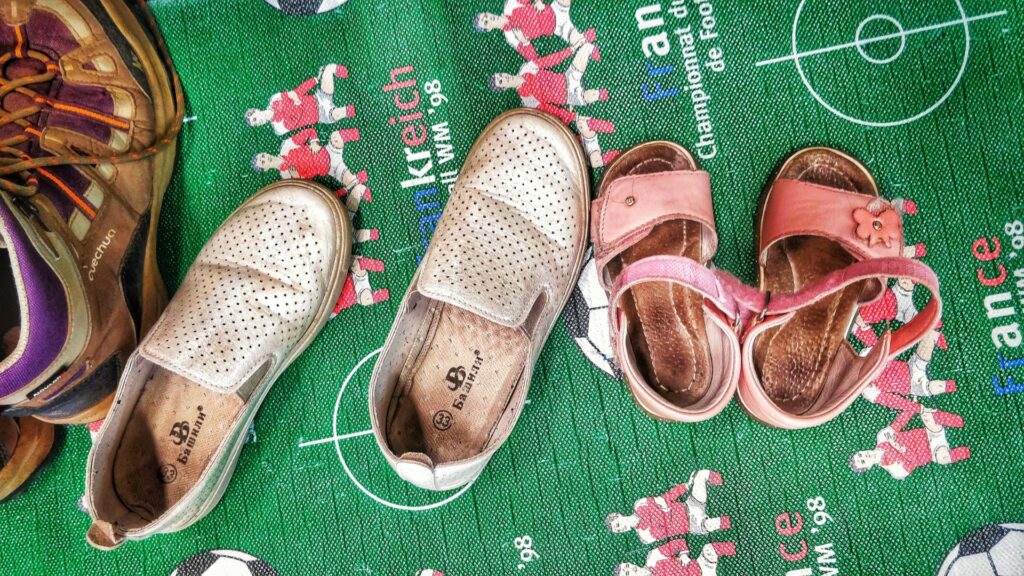
Day 3: Wednesday: We finally meet the kids!
We had breakfast at our apartment with my two fellow volunteers. Our workday started at 10 AM so had plenty of time to get ready in the morning. Not to mention that we were half an hour on foot from the refugee centre. But we didn’t mind the walk. It was great to have that time to be outdoors, move and talk with the other team members. And after a long day at the daycare, it was great to get some fresh air on our way to our shared apartment.
Once we got to the centre in the morning, we started working right away. First, we needed to finish organizing the space. We swept and washed the floors. We sharpened crayons, opened toys, and cut off tags from brand new items donated by IKEA. Then some curious girls visited us but we asked them to come back a little bit later when the space would be ready.
After lunch, we laid out rugs, cushions and gym mattresses. We made the place as cozy and inviting as possible. It became a little happy oasis of colour in the midst of the military green of the field beds.
Our first visitors were three sisters and another little girl. Because they all came from eastern Ukraine, they spoke Russian. We played Stary Niedźwiedź, Ciuciu Babka (two Polish childhood games) and pictionary. They were our lovely first “customers” for the inauguration of our daycare.
A few hours flew by and we found out the sisters were moving to their destination whatever it was. As a goodbye, we gave them drawing gift packs. Their dad came to say a very heartfelt thank you (Ukrainian men with at least three kids under 18 are exempt from military service). The girls said they would never forget us. It was beautiful. I felt wow – that was so easy! All I did was play with you little humans and the thanks we got were so heartfelt. It just shows you how a little effort and kindness can go a long way.
I couldn’t believe that we got such a strong connection from only a few hours together. You might think that daycare work at a refugee centre is unimportant. But in our training with the child psychologist, we were told about the concept of a safe adult and how crucial normal adults are for children who have gone or are going through trauma.
Life goes on even at a refugee point. During a break, one of our volunteers went swimming at a community pool next door. The other volunteer ate our lunch while listening to American soldiers playing guitar and singing. There is beauty everywhere, even in the middle of pain.
Later in the day, two more kids came to our daycare with their grandmother. She asked me to teach her how to pronounce animal names from a Polish kids book so that she could teach her young granddaughters. I was touched by this grandmother’s outlook of moving forward.
Later one of the girls began to tell us about the horrors she experienced. But her ever-present and vigilant grandmother instructed her to not talk about things like that. We were trained in our workshops not to pursue such topics or ask questions.
We didn’t have many kids on our first opening day. Some volunteers in Zamość said to us – “too bad you weren’t here last week. There was upwards of ninety kids running around wild then.” But the week we were there the influx of refugees had slowed down. We had heard the humanitarian corridor had been closed and a lot of people had no way of leaving, for now.
To celebrate our opening day, we treated ourselves to dinner out on the town in an Armenian/Georgian restaurant and then we went to bed early.
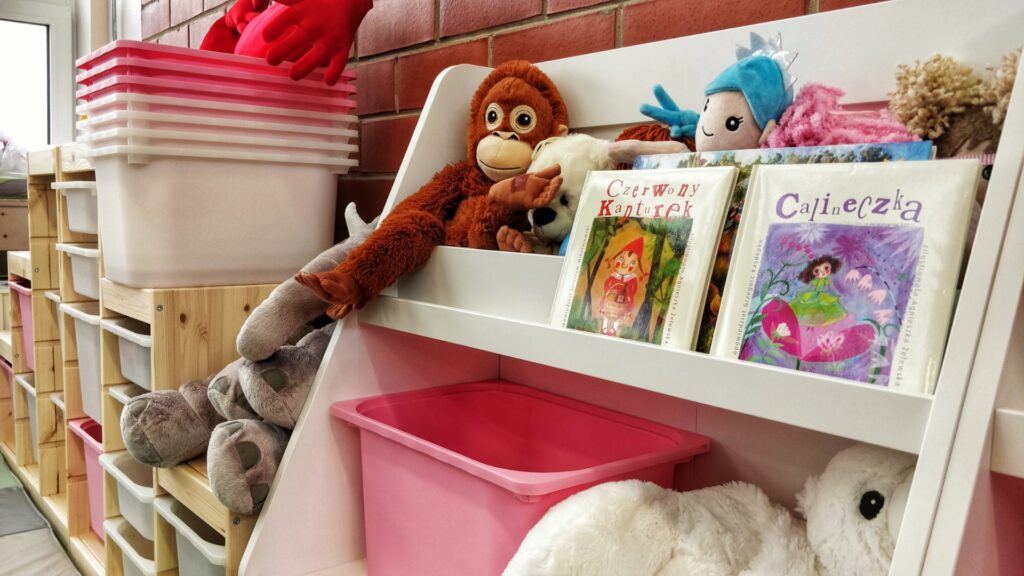
Day 4: Thursday: Getting into the swing of things.
I stayed in bed till 8 am although I woke up at 5 AM as our Ukrainian neighbour was in the kitchen cooking. The smell of fried meat permeated our apartment. Maybe this was the day he would be leaving for the front in Ukraine?
It was a rainy day and we had to walk to the refugee centre. During such weather we were not too thrilled to have to walk for 30 minutes to work. Luckily we were saved by our neighbour’s son who was driving on an errand and offered us a ride to the centre. How kind of him and lucky for us!
At 10 AM we came to the daycare, put some stray toys away. You cannot lock up the daycare for the night, it is just a play area in the corner so kids come and go as they please when the volunteers are gone.
We put up the sign from Fundacja Ocalenie to show that they were the ones behind this amazing project. One of the young girls from the day before came by to play for about 15 minutes. Then her mom came to get her as they were to move deeper into Poland. And then two young sisters came, one only two years old. I was sure they would be leaving soon too because their grandma was on the phone naming a Polish city to her relatives back in Ukraine.
Diagonally opposite of our daycare corner, on the other side of the gym, there was a welcome desk manned by some local volunteers. Some women came in to ask about moving on to other countries. They were offered to go to Sweden or Italy. But it sounded like they wanted to go back to Lviv. At the time that surprised me. Why would someone want to go back to a war zone?
We had a total of eight kids today including three Polish and one Bulgarian living in Zamość. They wanted to play with Ukrainian kids because they were curious about them. Before this war, there were not many international visitors in this part of Poland. We played a fun drawing and guessing game with them.
One of our team members had been suffering from a cough because of a chest infection she had a few weeks earlier. We discovered that the community centre next door also had a salt grotto which can be an amazing remedy for respiratory issues. We started going every day during our breaks.
In the evening, when we came back to our apartment, we discovered we had new neighbours in the third bedroom: a Ukrainian woman with her sister and her young daughter.
Day 5: Friday: We get some young troublemakers in our daycare.
We woke up to snow today.
Our new Ukrainian roommates who only spent one night in the third bedroom left this morning back for Ukraine. Apparently they were in Poland for ten days looking for jobs and accommodations. They had no luck and some unpleasant situations. Discouraged, they decided to return to Ukraine.
Our regional coordinator called us to ask about our needs and to arrange our return to Warsaw on Sunday. We felt very taken care of. Daily we communicated with someone from Fundacja Ocalenie and they were always very helpful.
When we showed up at the daycare in the morning, there were already four kids playing there. They were mostly self sufficient but very energetic and we had a hard time employing our day plan from our training back in Warsaw. Eventually we had to sit them down and find a quiet game. It wasn’t an easy task especially with one boy.
Another coordinator from the foundation came by and brought us a tablet from the foundation and different supplies. The tablet was to be used to daily record first names and ages of the kids and at what time they arrived. This was done for the internal purposes of the foundation to track the ongoing need for volunteers at the daycare centre.
The coordinator was super nice and ended up taking one of our volunteers who recently fled Ukraine on a search for a donated winter coat. It had snowed recently and felt very cold and she was lacking proper winter attire.
We had an interesting boy at the daycare today. He gave us a false name at the beginning, clearly a sign that he couldn’t yet trust us. After a few hours of playing together, he started to get very attached to me and revealed his true name. But his behaviour was very strange, both violent and loving, interchangeably. It was very odd. We had discussed many scenarios during our training in Warsaw and he was clearly going through something.
Later we learned that he didn’t have a mother. He fled Ukraine with his father and older brother. At times, he was very rough and prone to destruction but we found some soft spots in him. For example, he ended up feeling sorry for us that we didn’t have blue bracelets like he did (like the one they give at resorts) so we could get free food from the tent for refugees. We actually could get food at the centre but didn’t tell him to confuse him. So he ended up bringing us a cookie each at the end of the day.
We began to notice some centre politics. There might be some competing interests from different organizations, some religious. Occasionally, there would also be some self-important big ego but overall most volunteers were selfless and great. I even saw an older British man in the food tent asking what kind of food supplies were needed. He was back half an hour later with groceries he had bought for the centre. How lovely!
Life doesn’t stop at a refugee centre. There was a big commotion today to find a perfect cake from the best pastry shop for a woman’s 60th birthday.
We began to feel tired today. The work is exhausting even if you feel you haven’t done that much in a day. You have to watch your mood and not let one bad experience ruin your day. Self-care is important. Take the breaks, relax in the evenings, get a full night’s sleep.
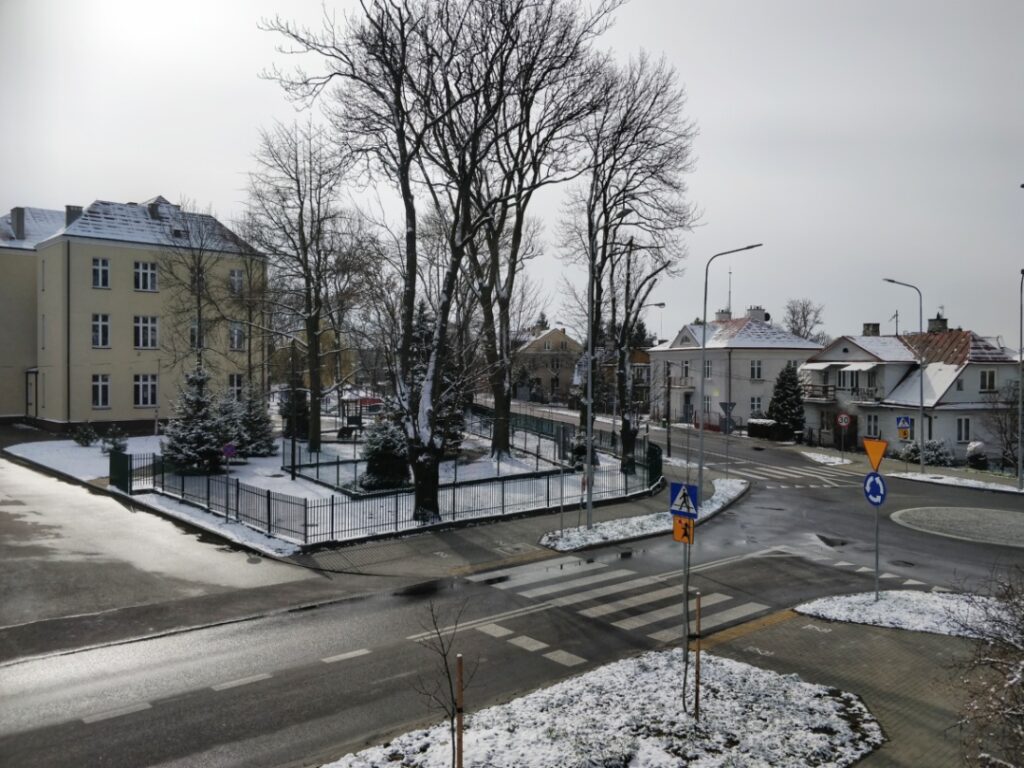
Day 6: Saturday: Last full day at the daycare.
It felt like we barely started getting into the swing of things and the next day we will head back for Warsaw. We worked our last full day today. I shared knitting instructions with the kitchen staff for my freedom hat that was made by a cousin in Warsaw.
Today we had a situation at the centre with a refugee with mental health issues. Paramedics came in to help.
In the evening, we treated ourselves to pizza at Pizza Roma. Highly recommend it if you are in Zamość. The owner spent many years living in Italy and picked up some great pizza-making skills. After dinner, we went out to Jazz Club Kosz to listen to a great jazz band. It was a perfect last night in Zamość.
Day 7: Sunday: We head back to Warsaw.
After breakfast, we packed and then headed to the daycare where we worked till 3 pm. It was tough to say goodbye to the kiddos. Then two volunteers from Hrubieszów came to meet us for lunch before taking us back to Warsaw with them. In the car, we shared stories from our two daycares. Once back in the capital, it was time to say goodbye to each other.
FAQ
If you are a European Union citizen, you do not need a visa in order to volunteer in Poland. All other nationals need to follow the same visa requirements as they would for regular travel to Poland.
Poland is a safe country overall. Follow the same safety precautions as you would anywhere else in Europe.
This depends on whether you will get housing and a meal allowance from the organization you will be volunteering with. If you need to pay for housing and food by yourself, budget a minimum of 100 zloty (about 25 euro) per day.
That will depend on the individual organization but most volunteering positions are for adults.
For some volunteering positions it is enough that you speak English but also knowing Polish would be ideal. If you are looking to volunteer with Ukrainian refugees then knowledge of Ukrainian or Russian would make your interactions a lot easier. And if you want to volunteer with refugees from Asia or Africa, then knowledge of Arabic or French would also be helpful.
The easiest and most convenient way to learn some basic Ukrainian before volunteering with Ukrainian refugees is through the free version of the Duolingo app.
Most of the Ukrainian refugees who fled the war starting in February 2022 have settled in Poland. The vast and sudden numbers of people have put a heavy strain on social infrastructure. Organizations helping refugees have a big and immediate need for volunteers.
Ideally when you volunteer with refugees in Poland you will be doing so with a reputable organization. They will assist you with housing at your volunteering post.
If you are volunteering in a bigger city, you will have no trouble finding vegan food establishments. If you are volunteering in small towns or villages near the Ukrainian border, you might have more difficulty sourcing vegan food.
Most Ukrainian refugees are living in Warsaw, Krakow and other big cities. Ukrainian refugees at the border with Poland are there only for a relatively short time as they decide where to settle.
The Polish government has created a one-stop website where volunteers looking for opportunities to help Ukrainian refugees can find organizations to volunteer with.
A successful and fulfilling volunteering trip abroad has several components. They are research, volunteering with the right organization, preparation, your volunteer posting, and after-the-fact evaluation.
The fastest way is to drive, but you can also fly to Lublin and then drive or take the bus from there. You can also take the train from Warsaw to Zamość but the train is about two hours slower than driving. Depending on the village you are going to, you will need to take another mode of transport from the train station. You might have to taxi, drive or take the bus.
Fundacja Ocalenie is a well-respected Polish NGO that has been helping refugees since year 2000. Their most recent work with Ukrainian children refugees has been carried out with the support of the Save the Children Fund and other partners.
Final Thoughts
I have to say that I surprised myself that I went through with traveling to volunteer at the Ukrainian border in Poland. I was nervous up until the moment I started working in the daycare. But the fact that I did it with an established, well organized and respected NGO like the Fundacja Ocalenie made all the difference.
I met people at the border who traveled to Poland on their own and their efforts were limited by the fact they were acting alone. Often refugees did not trust these solo volunteers without an affiliation to a known organization. And for good reason – human trafficking is of concern during a mass exodus in a time of war.
I know I will volunteer with refugees again. And very likely with refugee children. Now that I know I can do this and I have a blueprint for how to do it, I will look for opportunities to again donate my time with organizations that support refugees.
In the end, I found my time volunteering in Poland to be extremely rewarding. Not only did I feel like I helped even a little bit, but the entire experience was like therapy for me.
I felt uplifted for taking some good positive action despite being scared. My fears of the war were assuaged. I felt empowered by having done something difficult – traveling solo to another country in order to volunteer.
And I was inspired by being surrounded by so many wonderful volunteers from all walks of life and from different corners of the world. All united by one common goal – to be useful in the face of tragedy. To do something when people are being wronged. Because as Martin Luther King Jr. said: “Injustice anywhere is a threat to justice everywhere.”
Disclaimer:
This article is based on my personal experience volunteering with Fundacja Ocalenie in March and April 2022. Any errors, omissions and interpretations are my own. Any volunteering posts you sign up for may have a completely different structure or trajectory from what I experienced.
Pin It!
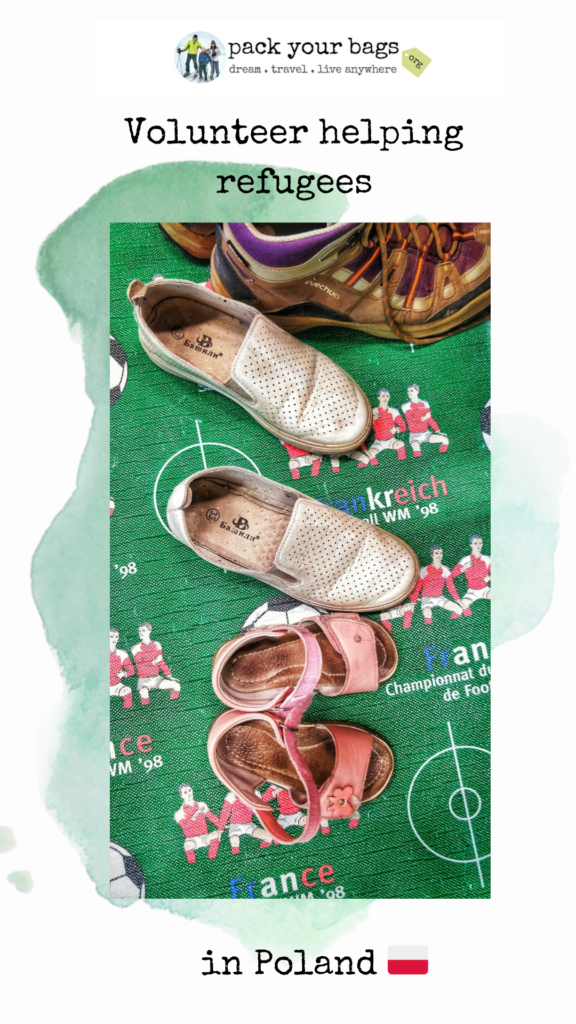
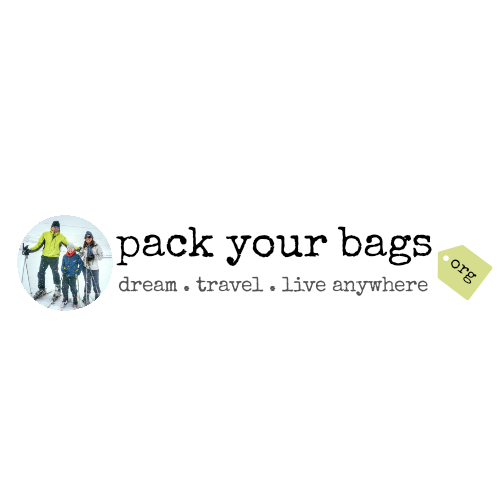

27 comments
This post is a true inspiration, thank you so much for sharing it! And BRAVO! 🙂
It’s such a sad situation that these children are in, but it’s great that there are people out there like you who are willing to help as much as possible.
Thanking you for sharing your story and providing insight and context we don’t always get to see. Your decision to volunteer is admirable and I’m sure you helped the kids you came in contact with while you were volunteering.
Thank you so much! I know that having volunteered in this capacity greatly helped me come to turns with the whole situation in that part of the world.
What an insightful post! And hats off to you and your generosity! Not many people would do it, soo inspiring! Thanks for sharing.
Awww, thank you. If I am honest I had to do it. I felt a need to do something like this.
I can’t say enough about how wonderful this is. Thank you for your work and for sharing with others who also may be able to help.
Thank you so much. That means a lot.
Thanks for taking the time to write and share such an informative post.
You are amazing! And I’ve been looking to volunteer somewhere in Europe, this is a great detailed post! W
Thank you! You are too kind. There are so many volunteering opportunities in Europe.
What a sad situation and bravo to you for helping the refugees. Your flexibility in your schedule has made a difference to those who need it.
It really is a difficult situation. And volunteers are still needed.
I really enjoyed reading your experience and I hope it inspires others to volunteer as well! Great work, Bea!
Thank you, Lasma!
Thank you so much for sharing your experience. This is something I have been thinking about doing but I wasn’t sure if I could be of any help since I don’t know any Russian. I do speak Polish, so it’s good to know that’s enough. I’ll definitely be looking into this, so thanks again for writing this!
Speaking Polish would definitely help. In fact, spoken Ukrainian and Polish have a lot of commonalities.
What a touching read! Thank you so much for your service in this urgent situation!
Oh this tugs at everyone of this Momma’s heartstrings! What an amazing experience for you knowing how many lives you touched during your experience. I will for sure save this in the hopes of taking part in it soon. Thank you!
Thanks, Trisha! I hope you get to volunteer with refugee kids.
I didn’t know that there were programs like this, but it really warms my heart! Thank you so much for your dedication and service to these youngsters, you are truly amazing! I hope to be able to do similar things when my kids get bigger and are more independent, so I’m bookmarking this for later. <3
What a truly remarkable experience. It is awesome that you were able to take a vacation with such a beautiful purpose. Thank you for spreading the word about ways we can be actionable.
Thanks, Theresa!
Your post was so inspiring! I’m a teacher in the United States. I wish I were closer to help too. I hope others are moved to help as well.
I hope so too, Michele. Often, the public gets fatigued with such events and refugees get forgotten.
I think it is really important, as you wrote, to volunteer with an established NGO. Thank you for sharing your experience.
Thanks, Faith. I truly believe going with an experienced NGO makes all the difference – both for the volunteers and the population being served.